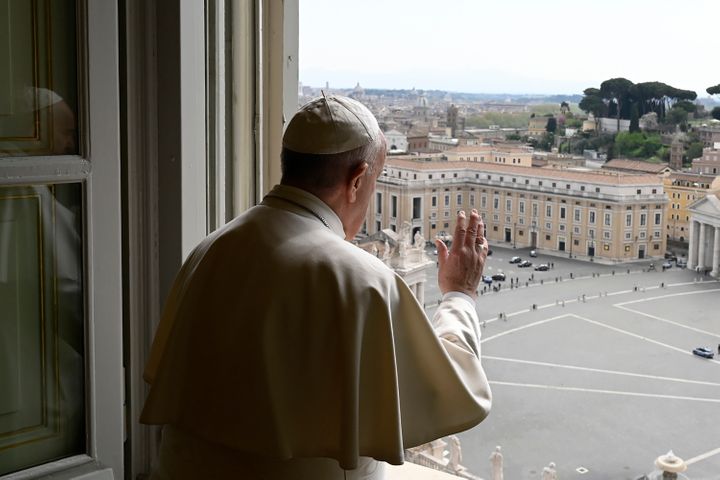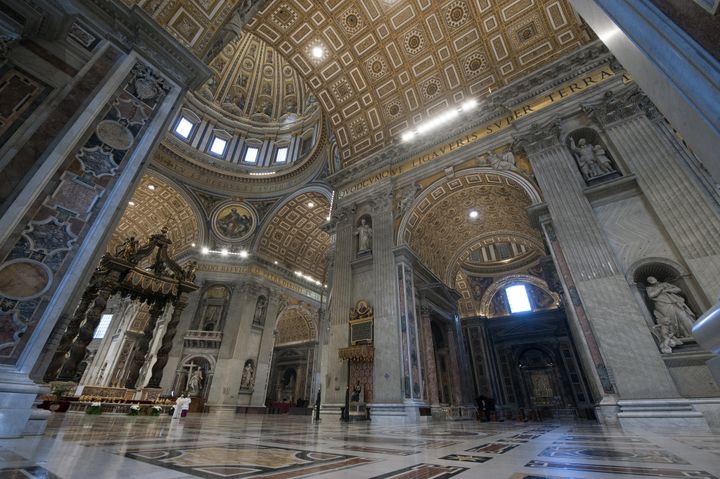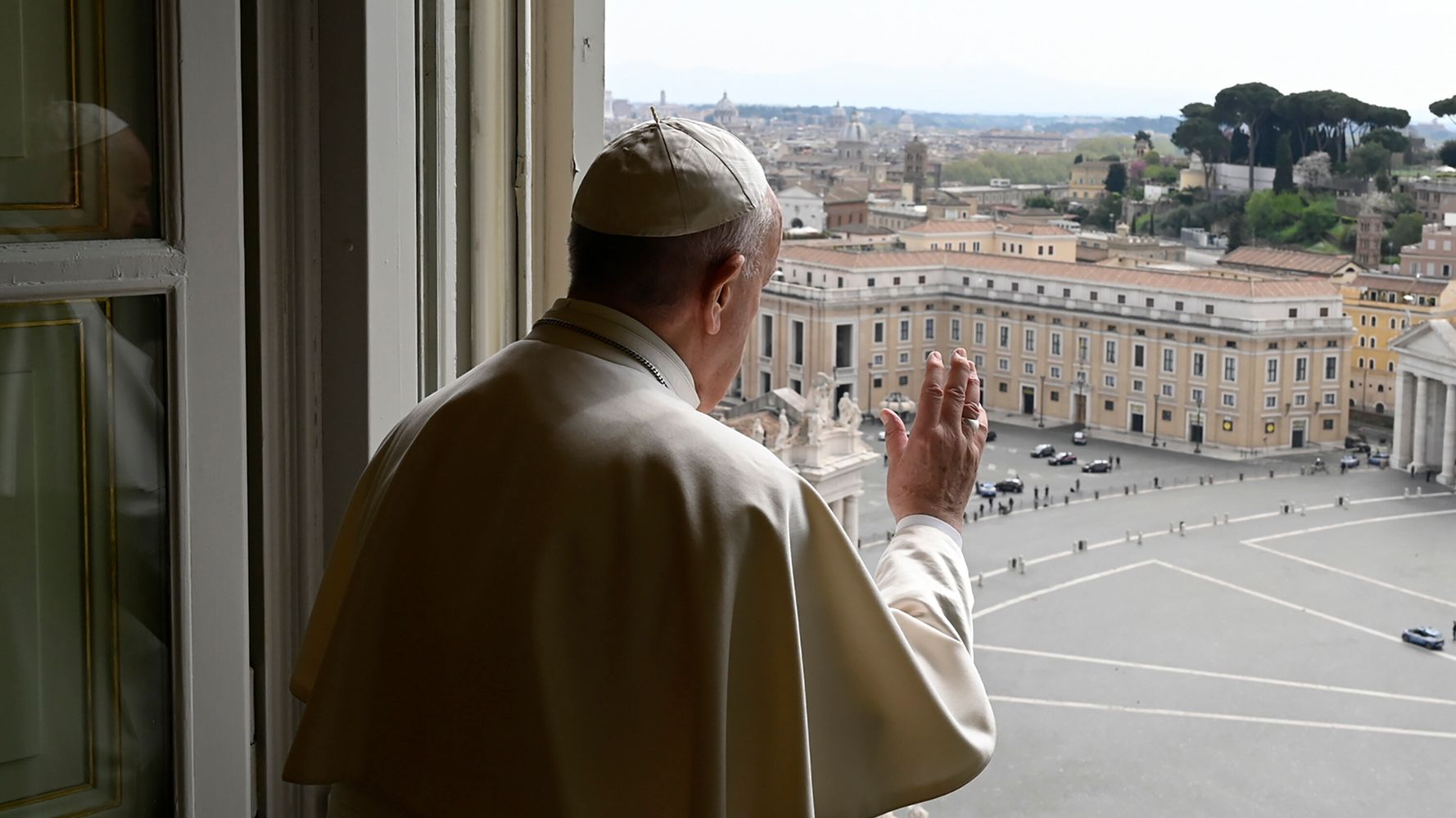[ad_1]
It may be time to consider a universal basic wage because the coronavirus pandemic impacts low-income workers “twice as hard,” Pope Francis suggested Sunday in a letter to members of social movements around the world.
Street vendors, small farmers, construction workers, gig workers and others have no steady income to get them through the global health crisis, the pontiff wrote. He said a universal basic wage would “acknowledge and dignify the noble, essential tasks” these workers carry out.
“It would ensure and concretely achieve the ideal, at once so human and so Christian, of no worker without rights,” he wrote.
The pope’s letter was meant for advocacy groups that attend the Vatican’s World Meeting of Popular Movements, an annual gathering of activists that organize for marginalized peoples, including the homeless, indigenous peoples, undocumented workers, and others without job security. In the U.S., these groups include organizations such as the National Domestic Workers Alliance and the Faith in Action network.
The pope didn’t offer any specifics about how he thinks such a policy would work in practice, but the letter encouraged social advocacy groups to continue fighting for those exploited and marginalized by the “the idolatry of money.”
“Our civilization — so competitive, so individualistic, with its frenetic rhythms of production and consumption, its extravagant luxuries, its disproportionate profits for just a few — needs to downshift, take stock, and renew itself,” Francis wrote.

Catholic ethicists and writers have had different interpretations of what Francis meant by “universal basic wage.” In the original text of the letter, the pope used the expression “el salario universal,” a Spanish phrase that is often used to refer to a universal basic income, according to the Jesuit magazine America. But Francis could also have been referring to a “living wage” or “just wage” for workers, which Catholic activists have pushed for decades.
The term universal basic income, or UBI, typically refers to giving people direct, regular cash payments in an effort to expand the social safety net and challenge wealth disparity. It’s a decades-old idea that has had many different iterations. It has picked up steam in recent years, thanks to small-scale experiments in Finland, Kenya, India, and the U.S. UBI has also attracted high-profile advocates, such as Facebook CEO Mark Zuckerberg and former Democratic presidential candidate Andrew Yang.
The emergence of the COVID-19 pandemic has caused some countries to start looking at adopting a UBI policy. Spain’s government, for example, is considering making some kind of guaranteed monthly payment to a large segment of its population.
The $2 trillion stimulus package that the U.S. Congress passed last month committed to giving people below a certain income bracket a one-time check of around $1,200 ― but did not include a universal and recurring payout to all Americans.
Joseph Tomás McKellar, co-director of PICO California, which is part of Faith in Action, said the pope’s letter shows that now is the time to “make a universal basic income a human right.”
“Pope Francis’s letter reminds us that no matter where we come from, what we look like, or how much money we have, it’s time to pull together and take care of one another,” McKellar said in a statement. “The choices our government makes now to help us weather this pandemic can also pave a better course for the future of our communities.”
Pope Francis’ stance on workers’ wages isn’t out of character for him, according to Kristin Heyer, a professor of theological ethics at Boston College. His letter echoes a longstanding concern for those exploited and left behind by an “economy of exclusion,” she said. The call to consider UBI is not necessarily at odds with Catholic social tradition, a set of key teachings on economic and social issues.
“This commitment to universal human dignity demands securing a threshold below which we should not allow those most vulnerable in society to fall, and the pope’s letter draws attention to a concrete measure to help secure this at the service of the common good,” Heyer said.

Francis has been criticizing trickle-down economics and income inequality since his first major text as pope in 2013, “Evangelii gaudium,” according to Kevin Ahern, an expert on Christian social movements at Manhattan College and the president of Pax Romana, a global Catholic lay movement.
And during a meeting in February, the pope signaled his support for universal basic income, universal health care and universal education as ways to reduce income inequality.
“The support of Pope Francis for a UBI is consistent with the century-old tradition of Catholic social teaching and its emphasis on labor justice, the rights of workers, and a living wage,” Ahern told HuffPost. “Like public education, unemployment, and social security, a universal basic income is a way to re-distribute from one part of the body/society to those parts in need.”
David Lantigua, a scholar of Christian ethics at the University of Notre Dame, had a different interpretation of the pope’s letter. Lantigua suggested Francis was talking about a “living wage” or fair pay that provides stability for workers and their families. This has been a key part of the Catholic Church’s support for labor unions in the past, and Lantigua said it shouldn’t be confused with the UBI policy touted by “Silicon Valley execs.”
“A universal basic income currently discussed in our nation would be nothing less than the kind of technocratic solution under a globalization of indifference that Pope Francis is warning about,” he said. “After all, the so-called ‘universal’ basic income is meant only for American citizens, not the poorest nations of the earth and certainly not undocumented persons who are often the most vulnerable to exploitation at work.”
A HuffPost Guide To Coronavirus
Calling all HuffPost superfans!
Sign up for membership to become a founding member and help shape HuffPost’s next chapter
[ad_2]
Source link

